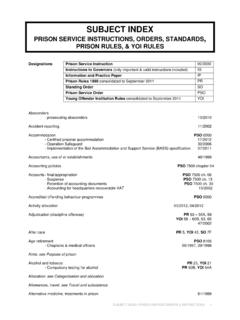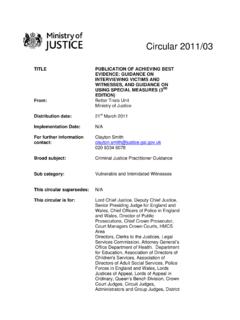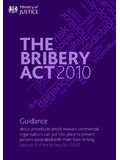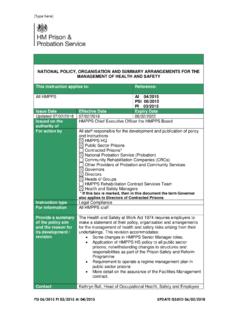Transcription of Government Response to the Justice Committee’s Report: …
1 Government Response to the Justice Committee s report : The role of the probation Service October 2011 Government Response to the Justice Committee s report : The role of the probation Service Presented to Parliament by the Lord Chancellor and Secretary of State for Justice by Command of Her Majesty October 2011 Cm 8176 Crown copyright 2011 You may re-use this information (not including logos) free of charge in any format or medium, under the terms of the Open Government Licence. To view this licence, visit or write to the Information Policy Team, The National Archives, Kew, London TW9 4DU, or e-mail: Where we have identified any third party copyright material you will need to obtain permission from the copyright holders concerned. Any enquiries regarding this publication should be sent to us at This publication is available for download at and on our website at ISBN: 9780101817622 Printed in the UK by The Stationery Office Limited on behalf of the Controller of Her Majesty s Stationery Office ID 2455357 10/11 Printed on paper containing 75% recycled fibre content minimum.
2 Government Response to the Justice Committee s report : The role of the probation Service Contents Introduction 3 Government Response to the Committee s conclusions and recommendations 5 The offender manager s relationship with offenders 5 National standards: discretion and professional judgement 6 Work with victims and restorative Justice 7 Working with particular groups of offenders 8 The benefits and limitations of the new training arrangements 9 Post-qualification and management training 11 National commissioning of probation services and performance framework 12 NOMS and national contracts 13 Local joint commissioning arrangements 13 The tendering process for community payback 14 Financial management 15 End-to-end offender management 16 Review of NOMS 17 Provision of services to the courts 18 Partnership schemes and the potential to pool resources 19 The role of the probation service in public protection 20 Public confidence in community sentences 20 The success of the proposed reforms in the context of fewer resources 23 Creating a mixed economy in probation
3 Provision 23 The benefits of paying providers by results 24 Commissioning for offender management: getting the balance right 24 Achieving savings 25 Commissioning principles 26 Immaturity of the current market 28 Transparency and an effective dialogue 28 Implications for training 29 The flexibility of contracts 29 1 Government Response to the Justice Committee s report : The role of the probation Service Diversity 30 Access to working capital 31 Choosing appropriate outcome measures 31 Graduated and differentiated payments 32 Developing a business case 32 Quality of the evidence base 32 Potential to strengthen the evidence base 33 Attributing results 33 2 Government Response to the Justice Committee s report : The role of the probation Service Introduction The Government welcomes the report of the Justice Committee s inquiry into the role of the probation Service.
4 We have given it very careful consideration. The inquiry report looks back at the history of probation over roughly the last ten years, including the creation of the National Offender Management Service (NOMS). This approach has the advantage of helping to explain how we have got to where we are now. It highlights the drawbacks of trying to micro-manage the work of probation professionals from the centre. Since May 2010, as the report recognises, there has been a radical change of direction. There is still a long way further to go, but we welcome the Committee s finding that there is a need for greater use of professional discretion by probation professionals and the role that the streamlined National Standards for the Management of Offenders can play in bringing that about. The report also highlights the need for sentencers to have at their disposal all the options they need and proposes that the private and voluntary sectors could play a greater role in delivering those but it acknowledges that, in the current financial climate, demands for more funding would not be realistic.
5 The Government entirely shares the Committee s view that there is an urgent need to focus resources on the front line and to continue to bear down on inefficiencies and any unnecessary back-room functions. The report successfully brings out the complexity of some key issues in probation work, most notably the difficult balance to be struck in making community sentences truly challenging, while ensuring that offenders are enabled and motivated to meet that challenge. However, on two issues, we cannot fully assent to the conclusions the Committee draws from the evidence presented to it. With regard to the quality of the evidence base, it is clear from the debate on how re-offending can best be measured that there is no consensus on how outcomes following community sentences and those following custody should be compared. This issue will continue to be the subject of debate. The Government cannot therefore accept that the recommendation to develop a measure that enables the effectiveness of prison and community sentences to be compared more robustly (paragraph 296) should be addressed solely to the Ministry of Justice .
6 A much wider discussion needs to take place in which the Ministry will play a full part. At a purely practical level, the recommendation at paragraph 244 that all sentences, whether to be served in custody or in the community, should be commissioned at local level may not give enough weight to the difficulties and intense pressures involved in providing custodial places, which the existing system manages very effectively. The courts rightly expect that every custodial sentence (unless the court decides to suspend it) will be given immediate effect. The recent disturbances are a prime example of the challenge that poses when there is a dramatic surge in demand from particular parts of the country. The National Offender Management Service has been 3 Government Response to the Justice Committee s report : The role of the probation Service able to respond to that challenge, but it is not clear that local commissioning arrangements would have been equally successful.
7 The Ministry of Justice is engaged in considering the future shape of probation services in England and Wales, with the aim of improving Justice outcomes and contributing to our work to find further efficiencies across all Justice services. This involves looking at a range of options for service improvements and different models for delivering offender services within the community. We will ensure that our proposals are aligned with our priorities for the broader Justice sector, including increasing competition, taking forward payment-by-results, and changes to wider structures and accountability at local level, as well as with the Government 's priority to open up public services to a range of providers, including mutuals. The Justice Committee s report is a valuable contribution to evolving thinking on how probation services can develop to protect the public and reduce re-offending: its conclusions and recommendations are informing our consideration of these important issues.
8 We plan to announce the outcome later in the autumn. 4 Government Response to the Justice Committee s report : The role of the probation Service Government Response to the Committee s conclusions and recommendations With the exception of recommendation 19, which is answered jointly with recommendation 10, the following Response follows the order of the Committee s conclusions and recommendations as set out in Chapter 8 of the report . The offender manager s relationship with offenders 1. We accept that probation officers have to do a certain amount of work which does not involve dealing directly with offenders. However, it seems to us staggering that up to three-quarters of officers' time might be spent on work which does not involve direct engagement with offenders. No-one would suggest that it would be acceptable for teachers (who also have to do preparatory work and maintain paperwork) to spend three-quarters of their time not teaching.
9 The value which really effective probation officers can add comes primarily from direct contact with offenders. While we do not want to impose a top-down, one-size-fits-all standard, it is imperative that NOMS and individual trusts take steps to increase the proportion of their time that probation staff spend with offenders. The MoJ and NOMS should state explicitly whether they support this aspiration; if they do, they should tell us how they intend to achieve it. (Paragraph 40) This recommendation echoes the Government s view that, until recently, probation professionals were required to spend too much time on bureaucratic tasks, thereby limiting the time available for face-to-face work with offenders. The evidence upon which it is largely based is a snapshot survey carried out in 2008. The aim of the present Government s policy is to enable offender managers to spend more time on face-to-face work with offenders, where that is necessary to manage the case effectively.
10 Good offender management, however, does involve some tasks designed to aid the offender s rehabilitation, which do not involve face-to-face contact: for example, the vital role to be played in promoting the co-operation of local partners to support the rehabilitation of offenders. We have taken, and will continue to take, a number of steps to free up offender managers time: for example, by reducing the number of centralised performance targets. We have also revised the National Standards for the Management of Offenders,1 making them less prescriptive, in order to increase the scope for the exercise of professional 1 5 Government Response to the Justice Committee s report : The role of the probation Service judgement. Offender managers now have greater flexibility to manage their time in accordance with their assessment of the requirements of each case. In order to quantify the costs of probation services, the Specification, Benchmarking and Costing (SBC) programme produces operating models which indicate how services can be delivered effectively.











